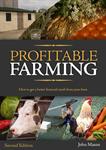Learn to Sell Farm Produce Better
Being a successful rural businessperson is a difficult managerial role. Very few non-rural businesses are presented with the continuing changes and variations that confront a rural business. The impact of climate means the rural manager has to continually consider, evaluate, assess (and reassess) often on a daily or even hourly basis, the numerous changes and types of information that may affect the rural business success.
Marketing is not just selling! It involves:
-
Attracting customers
-
Persuading them to buy
-
Selling
-
Keeping customers satisfied (so they come back!), by using the above and other strategies.
 This course develops your ability to analyse and manage marketing problems in an agricultural enterprise. Topics covered include: market research, management of your marketing, promotions, handling produce, packaging, distribution, customer relations and more.
This course develops your ability to analyse and manage marketing problems in an agricultural enterprise. Topics covered include: market research, management of your marketing, promotions, handling produce, packaging, distribution, customer relations and more.
Agricultural marketing is concerned with relating the supply of products to its potential demand in such a way as to satisfy the needs and wants of buyers and create a profit for the supplier. The process of marketing is that of transferring goods and/or services from producer to consumer at a profit. It should add maximum value to the product at minimum cost. Marketing is thus concerned with such activities as:- pricing, selling, merchandising, advertising, promotion, packaging, market research, transport, destination, placement, planning, and accounting. In fact, all those processes which will enable you to maximise the added value.
Course Structure
This course is comprised of eight lessons, outlined below:
1. Agricultural Marketing Concepts
- Marketing
- Goods and Services
- The Marketing Concept
- Managing the Marketing Process
- The Role of Marketing
- Approaches to Marketing
- The Goals of Marketing
- Organising, analysing, and selecting target markets
- Developing the Marketing Mix
- Managing the Market Effort
 2. Farm Marketing Objectives and Strategies
2. Farm Marketing Objectives and Strategies
- Supply and Demand
- Developing the Farm Marketing Plan
- Organising the Planning process
- Reviewing the Business's Situation
- Establishing Marketing Objectives
- Developing Strategies
- Market Penetration
- Price Advantages
3. Target Marketing
- Preliminary Research
- Target Markets in Agriculture
- Defining the Target
- Resources
- Analysing Market Opportunities
- External Influences
- General Economic Conditions
- Government Policy and Regulations
- Overseas influences
- Demographic Patterns
- Technological Change
- Customer Values and Attitudes
- Alternative Marketing Methods
- Internal Influences
- Selecting Target Markets
- Market Segmentation
 4. Handling Produce
4. Handling Produce
- Developing the Marketing Mix
- The "Product" element of the Marketing Mix
- Logos, packaging, positioning and image etc
- The "Price" Element of the Marketing Mix
- Pricing objectives and methods
- The "Promotion" element of the marketing Mix
- Publicity and Public Relations
- Advertising, sales and personal selling
- The "Place" element of the Marketing Mix
- Market coverage
- Determining Emphasis with the Marketing Mix
- Impact of Product Life-cycle
5. Customer Relations
- Customer Care Policy
- Levels of Involvement
- Effective Communication
- Becoming an effective communicator
- Dealing with complaints
- Self evaluation
- Maximising customer service
6. Market Research
- The Importance Of Market Research
- What to Research?
- The Research process
- Analysing Costs and Benefits
7. Promotions
- Promoting Product
- Creating customer awareness
- Promotional Campaign Strategy
- The Promotional Message
- Promotional Material
- Making Promotions Cost Effective
- Channels of Communication
- Publicity Marketing
- Advertising
- Structuring an Advertisement or Promotion
8. Managing Marketing
- Market Retention
- Balancing Strategy
- Market Development
- Market Growth
- Managing the Marketing Plan
- Sales and the Market
Aims
- Explain the role of marketing in business and the importance of marketing in the business plan.
- Assess the relative importance of marketing planning and to determine marketing strategies in relation to farming.
- Identify target markets to select suitable marketing methods.

- Explain the physical handling of products in the marketing process, including packaging, labelling, presentation and transportation.
- Plan to maintain sound customer relations in an agricultural business.
- Conduct market research into a product or service in the agricultural industry.
- Plan to manage the promotional program for an agricultural business.
- Develop strategies to manage the marketing of an agricultural enterprise.
Duration: 100 hours
Set Your Target Market First

Who are you going to try and sell to?
Some farmers aim to sell direct to the public (e.g. Through farmers markets, roadside stalls etc, while others sell to distributors, retailers or factories).
If you are a distributor, retailer or manufacturer, you may be receiving produce from a farmer, packaging/repackaging, processing and/or transporting it; and then selling it on to a retailer, the public or someone else. If you are in this position, you may not be a farmer; but you are still very much involved in agricultural marketing.
Sometimes you may be aiming to sell to a variety of target markets.
Defining the Target
There are many different ways you might define a target market; for example:
Example: If you aim to sell direct to the public, your target might be tourists and householders, mature adults of all ages. Alternatively, it might be a particular demographic income and age group living locally who will regularly purchase from you.
 Determining a Target According to Geography
Determining a Target According to Geography
This involves segmenting the market based on their geographic location. It is based on the premise that people with a similar geographical location will have similar wants, needs and priorities, and this will differ from people in other geographical locations. When we look on a global scale, this may be very true across different countries, where different cultures, lifestyles, living conditions, religions, and so on dictate very different wants, needs and priorities. For example, where someone in the USA may be considering which new tractor to buy, someone in another country may be considering which cow or camel to buy. Climatic factors can also come into play when we look at different geographical location. For example, ice cream and cold drink sales are likely to be higher in warmer climates than cooler climates, and in contrast, soup and woolly scarf sales will be higher in cooler climates.
On a smaller scale, there may also be differences between different neighbourhoods in a relatively small geographical area that would require different marketing strategies. For example, consider a city, affluent areas may buy gourmet foods; but less affluent places might not. So if you might attend farmers markets operating in localities appropriate to the type of produce you are selling.
Neighbourhoods will often also attract people of a similar socio-economic status, so where one neighbourhood may have high earners that would be a suitable market for high end luxury items, the next suburb over may be predominantly low earners, so would not respond to marketing for high end luxury items.
Determining a Target According to Demographics
Demographics describes identifiable aspects of a person, such as their age, gender, income, religious affiliations, occupation, culture, and education. All these things will affect a person’s purchasing behaviour, and will contribute to determining their want, needs and priorities.
Demographics commonly used to segment markets include:
- Age – this segments people into stage of life-cycle (eg. Infant, child, teenager, young adult, adult, middle-aged, old age) where it is likely that a persons’ needs, wants and priorities will differ between different stages of life in a fairly predictable manner (although there will of course be exceptions!).
- Sex – Traditionally markets could be divided into male and female with reasonable confidence, however in modern times as male and female stereotypical roles blur, sex becomes a less certain demographic on which to segment the market.
- Socio-Economic Status – this is determined by a person’s education, income, and occupation. The assumption here is that a person with a higher education would be more likely to be in a managerial or professional job the produces a high income. There are obviously exceptions to this rule. People with a higher Socio-Economic Status may be more targeted by marketers for higher end purchases, however people in less affluent areas may be choosing to buy things based on price first and quality second.
Determining a Target According to Psychographics
The term 'psychographics' has been used to refer to the technique of grouping consumers on the basis of their lifestyles, behaviours, attitudes and values. This goes beyond the hard data that is provided by demographics, and allows the deep motivations to be targeted more effectively. For example, does the customer value price or quality? Are they more likely to follow the crowd or do they want to do things differently? What types of celebrities are likely to inspire them to buy – sports person, fashion model, health conscious blogger, musician…?
By understanding the consumer on a deeper level, you are better able to target your advertising in a way that will attract them. It is suggested that people buy things to enhance the view they have on their own identity – by learning what this is for your consumer you will be able to create offers to appeal. For example, do they identify with high end luxury, organic and wholesome, trendy and cutting edge and so on?
To create customer profiles, psychographics has focused on:
- Activities – how people spend their time
- Interests – what people are interested in
- Opinions – how people view themselves and the world.
Categories then are created that group people with similar psychographics in order to segment the market. One form of psychographic segmentation is the American system VALS (values and lifestyles) which forms 8 categories - Innovators, Thinkers, Believers, Achievers, Strivers, Experiencers, Makers and Survivors. These categories can be used in marketing strategies.
It is important to remember that someone’s attitude, opinion and lifestyle is not always a predictor of their actual behaviour, other psychological factors also come into play.
Why Study This Course?
This course is suitable for anyone working within the farming industry or wanting to sell farm produce.
A niche course to update and improve your knowledge of marketing, specifically focusing on agricultural marketing.
The course can be studied online or by e-learning.
It is self-paced and can be studied from anywhere in the world.
This course is suitable for different people including:
- Farmers
- Farm workers
- Hobby farmers
- Market gardeners
- Small holders
- Farmer's market sellers
- Farm produced retailers
There is more to marketing than meets the eye!
Studying this course can open your eyes to more than you might imagine. If you can already imagine it; you might not need the course; but if you can't see how to increase sales; and need to .... this course may be a game changer for your farm.